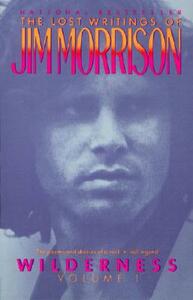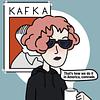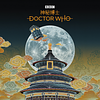Take a photo of a barcode or cover
I was honestly surprised by how good some of his poetry is. The rating is for the good poems; a lot of stuff in this volume is throwaway.
inspiring
reflective
fast-paced
Jim’s stream of consciousness poetry isn’t something that will impact you and stay with you, but as a Doors fan it is insightful for his process
challenging
reflective
medium-paced
adventurous
challenging
funny
lighthearted
mysterious
reflective
fast-paced
Some of this is classic Lizard King--by turns cutting, clever, romantic, grotesque. But some of it is just gut-wrenching--intimate, honest, and tragically prescient.
I bought this volume of Jim Morrison’s poetry at Starrlight Books, a great shop in Flagstaff, Arizona. I’ve been fascinated with Morrison since I first started listened to the Doors back in high school in the 80s. This is a wonderful collection that goes, in my opinion, far beyond his writings with that band. I’m so glad to have picked it up and will place it among my other treasured books.
I read this volume straight through it on the plane ride home a few days later. A few of my recent reading selections haven’t grabbed my interest. I’ve even resorted to skimming through parts. That wasn’t the case with this work. I read every word of each poem, sometimes flipping back a few pages to reread one that was echoing in the back of my mind. I scribbled a quick note saying that he wasn’t like most modern poets I’ve read. Morrison reminded me more of 18th and 19th century poets. Perhaps that’s because of what I mostly read nowadays, but I think it’s also since he drew a lot of inspiration from poets of that era, such as Blake and Rimbaud.
While everything resonated with me, there were a few lines that stood out. Echoing the second generation of Romantics (e.g. Shelley and Keats), Morrison writes: “Shrill demented sparrows bark / The sun into being. They rule / dawn’s Kingdom” (p. 35). In a poignant commentary on social relationships, he says
I read this volume straight through it on the plane ride home a few days later. A few of my recent reading selections haven’t grabbed my interest. I’ve even resorted to skimming through parts. That wasn’t the case with this work. I read every word of each poem, sometimes flipping back a few pages to reread one that was echoing in the back of my mind. I scribbled a quick note saying that he wasn’t like most modern poets I’ve read. Morrison reminded me more of 18th and 19th century poets. Perhaps that’s because of what I mostly read nowadays, but I think it’s also since he drew a lot of inspiration from poets of that era, such as Blake and Rimbaud.
While everything resonated with me, there were a few lines that stood out. Echoing the second generation of Romantics (e.g. Shelley and Keats), Morrison writes: “Shrill demented sparrows bark / The sun into being. They rule / dawn’s Kingdom” (p. 35). In a poignant commentary on social relationships, he says
Actors must make us thinkReminding me of my own youth, when we didn’t have 24-hour radio or online streaming: “When radio dark night existed / & assumed control, & we rocked in its web / consumed by static, & stroked with fear / we were drawn down long from / a deep sleep” (p. 135). Finally, from his poem “As I Look Back” (p. 201):
they’re real
Our friends must not
make us think we’re acting
(p. 117)
As I look back
over my life
I am struck by post
cards
Ruined Snap shots
faded posters
Of a time, I can’t recall
I think that Jim Morrison had an approach to poetry that was not unlike the ancient Oriental method described by Wei T'ai in the 11th century; "Poetry presents the thing in order to covey the feeling. It should be precise about the thing and reticent about the feeling, for as soon as the mind responds and connects with the thing the feeling shows in words; this is how poetry enters deeply into us. If the poet presents directly feelings which overwhelm him, and keeps nothing back to linger as an aftertaste, he stirs us superficially; he cannot start the hands and feet involuntarily waving and tapping in time, far less strengthen morality and refine culture, set heaven and earth in motion and call up spirits!"
Morrison mentions this of poetry in an interview; "Listen, real poetry doesn't say anything, it just ticks off the possibilities. Opens all doors. You can walk through any one that suits you.. . . and that's why poetry appeals to me so much - because it's so eternal. As long as there are people, they can remember words and combinations of words. Nothing else can survive a holocaust but poetry and songs. No one can remember an entire novel. No one can describe a film, a piece of sculpture, a painting, but so long as there are human beings, songs and poetry can continue.
If my poetry aims to achieve anything, It's to deliver people from the limited ways in which they see and feel."
Morrison has remained an influence on my work for over 20 years now-I remember classes in Graduate school in which his poems or name would come up and it was always in a disregarding fashion, yet his books of poetry have been among the highest sellers of all time in that genre (and continue to be). Morrison was Blakean in poetic sensibility and Nietzschian in philosophy which is a terrifying combination if you think about it-he sought to be rid of the 'Mind Forged Manacles' that Blake spoke of and also desired a 'World as a will to power and nothing more' as Nietzsche mentions.
There is something of the eternal and the powerfully visionary about Morrison's work that remains- he was and also is a controversial figure, a poet that attempted to re-create the theater of Artaud in a way that would inform later performers like Alice Cooper and Marilyn Manson. I think that Morrison's contribution to modern poetry was much more significant than he is currently being given credit for in the Academy.
* Notes about Morrison regarding his poetry by the Poet Michael McClure; " One of the things I like about this biography is that it shows that Jim knew himself to be a poet. That was the basis of my friendship and brotherhood with him,-I know of no better poet of Jim's generation. Few poets have been such public figures or entertainers (perhaps Mayakovsky in Russia in the twenties and thirties) and none have had so brief or so powerful a career."
Morrison mentions this of poetry in an interview; "Listen, real poetry doesn't say anything, it just ticks off the possibilities. Opens all doors. You can walk through any one that suits you.. . . and that's why poetry appeals to me so much - because it's so eternal. As long as there are people, they can remember words and combinations of words. Nothing else can survive a holocaust but poetry and songs. No one can remember an entire novel. No one can describe a film, a piece of sculpture, a painting, but so long as there are human beings, songs and poetry can continue.
If my poetry aims to achieve anything, It's to deliver people from the limited ways in which they see and feel."
Morrison has remained an influence on my work for over 20 years now-I remember classes in Graduate school in which his poems or name would come up and it was always in a disregarding fashion, yet his books of poetry have been among the highest sellers of all time in that genre (and continue to be). Morrison was Blakean in poetic sensibility and Nietzschian in philosophy which is a terrifying combination if you think about it-he sought to be rid of the 'Mind Forged Manacles' that Blake spoke of and also desired a 'World as a will to power and nothing more' as Nietzsche mentions.
There is something of the eternal and the powerfully visionary about Morrison's work that remains- he was and also is a controversial figure, a poet that attempted to re-create the theater of Artaud in a way that would inform later performers like Alice Cooper and Marilyn Manson. I think that Morrison's contribution to modern poetry was much more significant than he is currently being given credit for in the Academy.
* Notes about Morrison regarding his poetry by the Poet Michael McClure; " One of the things I like about this biography is that it shows that Jim knew himself to be a poet. That was the basis of my friendship and brotherhood with him,-I know of no better poet of Jim's generation. Few poets have been such public figures or entertainers (perhaps Mayakovsky in Russia in the twenties and thirties) and none have had so brief or so powerful a career."
fast-paced






